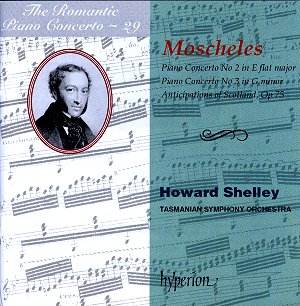Prague born Ignaz Moscheles grew to maturity as a young
virtuoso alongside such contemporary titans as Hummel, Cramer and Weber.
Venerating Mozart and Clementi he lived to see the adulation of the
Liszt cult and it’s perhaps tempting to see Moscheles as a locus classicus
of the early romantic dilemma – inheritor of Mozartian procedures but
straining to encompass a wider body of expression. In that of course
he was not alone – and I think it would be fair to say that he succeeded
far more comprehensively and more persuasively in his solo piano works
than in his concertos. He apparently admitted that he found problems
with the orchestration of the Concertos, though there is certainly nothing
either improper or limited in a conventional sense about the carapace
he placed around the solo part. But there is, ultimately, a lack of
melodic distinction to these works that render them peripheral to the
struggles of the early romantic literature, though not, obviously, without
moments of interest.
Moscheles wrote eight Piano concertos between 1819-38.
The Third is the best known and has been recorded several times before.
It’s a strong, powerful work that struggles to balance Classical equilibrium
with more subjective Romantic elements. The maintenance of such dichotomous
material was inherently problematical, though it has to be said that
Moscheles’ acknowledgment of it was implicit in his scores and it’s
a welcome sign of his imaginative engagement that he was prepared to
attempt the coalescence of such material in his writing. To the Mozartian
frame Moscheles looked to Beethovenian propulsion. This added a determined
syntax to the development of the First Movement of the Third Concerto
which still manages to breathe effortlessly. The slow movement’s brass
interjections and thematically rather theatrical gestures lead to the
piano’s scampering insouciance; Moscheles floods the movement with lightness
and a measured largesse of spirit but is reluctant ever to plumb great
fissures of feeling. He remains an urbane cosmopolitan when it comes
to depth. In the earlier Concerto, published in 1825 but first performed
some years previously his Mozartian proprieties are fleshed out orchestrally,
extended but never inflated. Throughout the first movement elements
of Polonaise rhythm threaten to become explicit and the anticipation
of Chopin is palpable here; it wasn’t only Field and Hummel who occupied
some amorphous proto-Chopinesque territory. Again Moscheles’ slow movement
is a decorative and rather frilly one whilst the dotted noted finale
makes clear what the first movement hinted at – a Polish dance movement.
The grandiloquently titled Anticipations of Scotland; A Grand Fantasia
was written when Moscheles lived in England – as he did for over twenty
years; playful, frequently variational in form, employing the expected
dance rhythms. Performances are good; sometimes the strings sound undernourished
in the Concertos. Not a disc of undiscovered masterpieces obviously
but a sure reflection of the dilemmas confronting a talented composer,
thematically and stylistically, during two decades of the early nineteenth
century.
Jonathan Woolf
Hyperion
Romantic Piano Concerto Series


